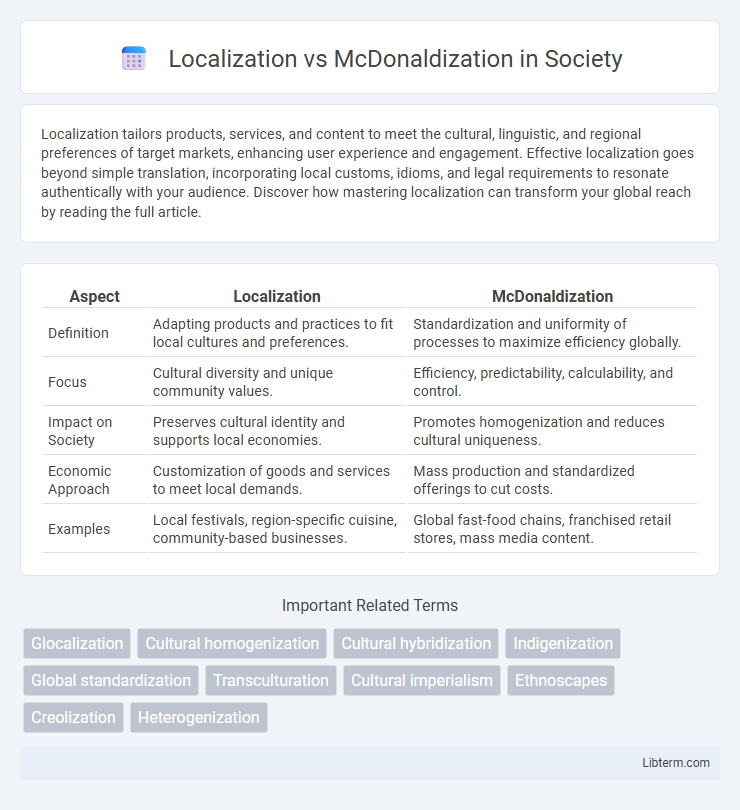Localization tailors products, services, and content to meet the cultural, linguistic, and regional preferences of target markets, enhancing user experience and engagement. Effective localization goes beyond simple translation, incorporating local customs, idioms, and legal requirements to resonate authentically with your audience. Discover how mastering localization can transform your global reach by reading the full article.
Table of Comparison
| Aspect | Localization | McDonaldization |
|---|---|---|
| Definition | Adapting products and practices to fit local cultures and preferences. | Standardization and uniformity of processes to maximize efficiency globally. |
| Focus | Cultural diversity and unique community values. | Efficiency, predictability, calculability, and control. |
| Impact on Society | Preserves cultural identity and supports local economies. | Promotes homogenization and reduces cultural uniqueness. |
| Economic Approach | Customization of goods and services to meet local demands. | Mass production and standardized offerings to cut costs. |
| Examples | Local festivals, region-specific cuisine, community-based businesses. | Global fast-food chains, franchised retail stores, mass media content. |
Understanding Localization and McDonaldization
Localization emphasizes adapting products, services, and business strategies to fit the cultural, linguistic, and societal preferences of specific regions, enhancing relevance and customer engagement. McDonaldization refers to the process where principles of fast-food restaurants--efficiency, calculability, predictability, and control--are applied across various industries, leading to standardization and homogenization of experiences worldwide. Understanding these concepts involves recognizing localization's role in catering to diverse local needs while McDonaldization drives global uniformity and streamlined operations.
The Origins of Localization and McDonaldization
Localization originates from cultural adaptation theories emphasizing the importance of tailoring products, services, and marketing strategies to fit local customs, languages, and consumer preferences. McDonaldization, a concept introduced by sociologist George Ritzer in 1993, describes the process by which the principles of the fast-food industry, such as efficiency, calculability, predictability, and control, dominate other sectors of society and culture. These origins reflect contrasting approaches: localization centers on cultural specificity and diversity, while McDonaldization highlights uniformity and standardization.
Key Features of Localization
Localization emphasizes adapting products, services, and marketing strategies to meet the cultural, linguistic, and social preferences of specific regions or communities. Key features include cultural customization, language translation, and sensitivity to local customs and regulations, ensuring relevance and acceptance by the target audience. It contrasts with McDonaldization, which prioritizes standardization, efficiency, and uniformity across global markets.
Core Principles of McDonaldization
McDonaldization centers on efficiency, calculability, predictability, and control through non-human technology, emphasizing standardized processes and quantifiable outcomes. This model contrasts with localization, which values cultural authenticity, adaptability, and human-centric interactions reflecting local customs and preferences. The core principles of McDonaldization aim to create uniform consumer experiences globally, often at the expense of unique cultural identities.
Localization in Global Business Strategies
Localization in global business strategies emphasizes adapting products, marketing, and operations to fit the cultural, linguistic, and regulatory preferences of specific markets. This approach increases customer relevance and engagement by respecting local customs and consumer behaviors, which boosts brand loyalty and competitive advantage. Contrasting with McDonaldization's standardization, localization drives innovation tailored to diverse market demands and fosters sustainable growth through regional responsiveness.
Impact of McDonaldization on Culture and Society
McDonaldization, characterized by efficiency, calculability, predictability, and control, exerts a profound impact on culture and society by promoting homogenization and standardization of cultural practices. This phenomenon often leads to the erosion of local customs, traditions, and identities as globalized, uniform experiences replace diverse cultural expressions. As a result, social interactions become more impersonal and consumer-driven, reducing the richness of cultural diversity and altering community dynamics.
Case Studies: Localization vs McDonaldization in Practice
Case studies of localization vs McDonaldization reveal contrasting approaches in global business strategies, with localization emphasizing cultural adaptation and McDonaldization focusing on standardization and efficiency. For example, McDonald's in India adapts its menu to local tastes by offering vegetarian options, reflecting localization principles while maintaining global brand consistency. Similarly, Starbucks employs localization by incorporating regional flavors and store designs, demonstrating how global brands balance McDonaldization with local consumer preferences for market success.
Benefits and Drawbacks of Localization
Localization offers benefits such as cultural relevance, improved customer satisfaction through tailored products, and enhanced market penetration by addressing local preferences. Drawbacks include increased operational complexity, higher costs associated with customization, and potential inconsistencies in brand identity across regions. Balancing localization efforts helps companies effectively engage diverse markets while maintaining global standards.
Risks and Challenges of McDonaldization
McDonaldization, characterized by efficiency, predictability, calculability, and control, presents risks such as cultural homogenization, loss of local diversity, and reduced creativity in global markets. This model often challenges localization efforts by imposing standardized practices that may not align with unique cultural preferences and values, causing consumer alienation. Furthermore, McDonaldization can lead to environmental degradation and labor exploitation due to its emphasis on mass production and cost-cutting measures.
The Future of Globalization: Balancing Localization and McDonaldization
The future of globalization hinges on balancing localization, which emphasizes cultural uniqueness and local adaptation, with McDonaldization, characterized by standardized, efficient global business models. Successful global strategies will integrate local customs, tastes, and consumer behaviors while maintaining streamlined operations inspired by McDonaldization's efficiency and predictability. This equilibrium enables multinational corporations to resonate with diverse markets and sustain competitive advantages in an interconnected world.
Localization Infographic

 libterm.com
libterm.com